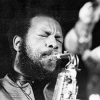Ornette Coleman

Ornette Coleman
Randolph Denard Ornette Colemanwas an American jazz saxophonist, violinist, trumpeter, and composer. He was one of the major innovators of the free jazz movement of the 1960s, a term he invented with the name of an album. Coleman's timbre was easily recognized: his keening, crying sound drew heavily on blues music. He was awarded a MacArthur Fellowship in 1994. His album Sound Grammar received the 2007 Pulitzer Prize for music...
NationalityAmerican
ProfessionSaxophonist
Date of Birth9 March 1930
CityFort Worth, TX
CountryUnited States of America
I asked my mother could I have an instrument. She said, 'Well if you go out and save your money.' So I went and got - I made me a shine box. I went out and started shining shoes, and I'd bring whatever I made.
I remember once I read a book on mental illness and there was a nurse that had gotten sick. Do you know what she died from? From worrying about the mental patients not being able to get their food. She became a mental patient.
I decided, if I'm going to be poor and black and all, the least thing I'm going to do is to try and find out who I am. I created everything about me.
I'm interested in music, not in my image. If someone plays something fantastic, that I could never have thought of, it makes me happy to know it exists.
The idea is more important than the style you're playing in.
I think that those elements - light and sound - are beyond democratic. They're into the creative part of life.
The only thing my mother would say about my music-I'd say, "Mom, listen to this," and she'd say, "Junior, I know who you are.
Most of my relationships have been like that - with record companies. I've never had a legitimate business relationship with a company. I've always had a personal relationship with someone in the company.
You don't have to worry about being a number one, number two, or number three. Numbers don't have anything to do with placement. Numbers only have something to do with repetition.
Whatever you do, it's over when you do it - but first you have to do it.
Music has many uses and I think the most perfected use that music has is one of a healing quality.
That's what I was trying to say when we were talking about sound. I think that every person, whether they play music or don't play music, has a sound - their own sound, that thing that you're talking about.
I have often read critical pieces where the critic said that what the composer was trying to do didn't come off. I have wondered what the critic meant if he didn't know what the composer was trying to do.
We in the Western world suffer from too many categories and classes; we've forgotten that we all still have diapers on. We've separated music from life.